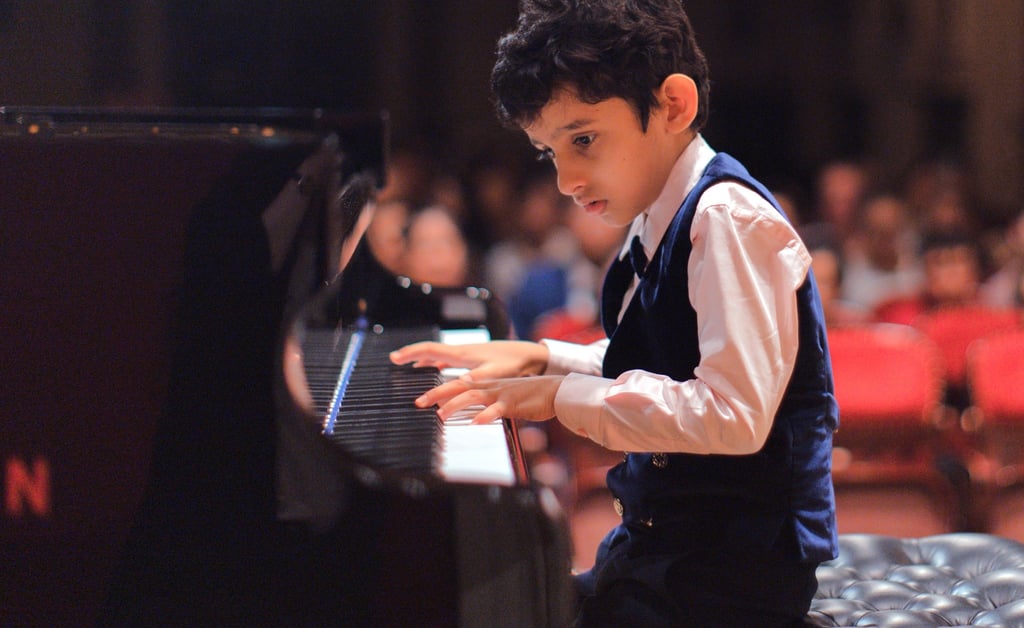From Nerves to Applause: Mastering Confidence, Connection & Stage Presence as a Musician
Stage fright is a common companion for musicians of all levels - but so is the power to rise above it. In this blog, we unpack how musicians can build authentic confidence, connect with audiences, and develop a magnetic stage presence. Whether you're playing your first recital or headlining a concert, learn how to turn performance anxiety into artistic energy - and leave the stage to roaring applause.
MUSIC EDUCATIONMUSIC PERFORMANCESKILL DEVELOPMENT
From Nerves to Applause: Mastering Confidence, Connection & Stage Presence as a Musician
The stage is set. The lights warm your skin. Your instrument feels different - heavier, louder, or even a little foreign. Your heart beats like a metronome gone rogue. You hear your cue... and suddenly, it’s just you and the music.
Whether you're performing a simple étude or a complex concerto, nerves are part of the journey. But stage presence, connection, and confidence are skills musicians can build - not qualities you're just born with. Here’s how to go from shaky fingers to standing ovations.


🎻 1. Stage Fright Isn’t a Flaw - It’s a Signal
First, let’s stop seeing nerves as the enemy. That surge of adrenaline before a performance? It’s your brain getting ready to do something important. Instead of suppressing it, learn to ride the wave.
That dry mouth? It’s energy.
That fast heartbeat? It’s readiness.
Those butterflies? They’re excitement disguised as fear.
Reframe it: You’re not scared - you’re charged. Like tuning your instrument, you’re just aligning your inner state with the moment.
Musical confidence isn't arrogance. It's muscle memory, emotional preparation, and repetition - lots of it.
Chunk Practice: Break pieces into sections. Don’t just run the piece - target tricky transitions, rhythms, or shifts.
Mock Performances: Set up a “mini recital” at home. Record yourself. Play for friends or even pets. Create stage conditions before you’re actually on one.
Performance Dress Rehearsals: Practice walking on stage, bowing, setting up your instrument, and starting with a smile. These “non-musical” parts are part of the performance too.
Bonus Tip: When you rehearse recovering from mistakes, you build resilience, not just technical skill.
🎹 2. Confidence Comes From the Practice Room - Not the Stage
Audiences don’t just want to hear your music - they want to feel your message. Even if you’re playing classical repertoire, you are the storyteller.
Facial Expression Matters: Let your face reflect the mood of the music. Don’t be afraid to feel what you play.
Eyes Up, When Possible: Pianists or violinists may be focused on the score or technique, but in moments of calm, lift your gaze. A glance into the crowd - even briefly - builds connection.
Own the Emotion: If your piece is joyful, mournful, intense, or playful - let your body and presence embody it. The audience mirrors your energy.
Remember: You’re not just playing notes. You’re offering an experience.
🎼 3. Connection Is the Secret Ingredient
You could play a piece flawlessly and still leave the audience unmoved if your presence doesn't engage them. The way you walk on stage, hold your instrument, and own your space speaks volumes.
🎤 What Builds Musical Stage Presence?
Posture: Stand (or sit) tall and grounded. A slumped stance looks unsure - even if your playing is strong.
Transitions Between Pieces: Pause with intention. Breathe. Let the silence be part of the performance.
Recovery: If something goes wrong - missed note, broken piano string, unexpected sound - don’t grimace. Keep playing. Smile. The audience is rooting for you more than you think.
Truth: Most people don’t notice mistakes unless you tell them - with your body language.
🎷 4. Stage Presence Is a Performance in Itself
Mental training is often the most overlooked part of a musician's preparation. But elite performers - soloists, composers, conductors - all practice inner performance habits.
Visualisation: Imagine yourself playing with confidence, hearing each phrase, and soaking in applause. The brain rehearses success when you do this.
Affirmations: Before going on stage, say things like:
“I am ready.”
“I share beauty through my music.”
“I trust my preparation.”Mindful Breathing: Try a simple breathing pattern - inhale for 4, hold for 4, exhale for 6. It lowers stress hormones and centres your focus.
🧠 5. Your Mind Is an Instrument Too
Every musician makes mistakes - even world-class performers. The difference? Professionals recover gracefully and keep the musical flow alive.
Don’t Stop the Music: Unless the error is catastrophic, keep playing. Most listeners won’t even know.
Stay in Character: If the piece is joyful, don’t let a slip turn your smile into panic.
Use It as Fuel: One mistake doesn’t ruin a performance. Often, it makes you more human - and relatable.
Remember: You’re not aiming for perfection. You’re aiming for connection.
🎻 6. What If I Mess Up?
One of the most powerful mindset shifts? Realising that performance is not a test - it’s a gift. You're not standing on stage to prove yourself. You're there to share something beautiful with others.
Your audience came to listen, not judge.
Your music might be the highlight of someone’s day.
Your performance could inspire a child to pick up an instrument.
Shift the focus from self-consciousness to service. You’re not just playing music - you’re creating a shared emotional experience.
🪕 7. It's Not About You Alone
Confidence, connection, and presence aren’t magic - they’re habits, rehearsed like any piece. Every performance is a new opportunity to grow - not just as a musician, but as a communicator.
So next time you walk on stage, take a breath, lift your head, and remember:
🎶 You are more prepared than you feel.
🎶 Your music matters.
🎶 The applause isn’t the goal - it’s the echo of the moment you shared.
🎵 Final Cadence: Your Music Deserves to Be Heard
Share this on:
About The Author


Padmavathy Divakaran is a distinguished pianist, arranger, and music educator, currently serving as the Director of Aum Piano Studio. Formerly the representative for MTB Exams in Tamil Nadu and Karnataka - a globally recognised music education board based in the UK - she has consistently championed excellence in music education. Padmavathy holds a BA (Honours) in Music from Middlesex University, London, and a Diploma in Higher Education – Music from KM College of Music and Technology, Chennai. Her outstanding talent has been recognised through multiple scholarships and awards, including those presented by Dr. A.R. Rahman. As a performer, she has showcased her versatility across classical and contemporary genres, playing with orchestras in both London and Chennai. She was a core member of the Roliwood Seaboard Ensemble, playing a key role in the global launch of the ROLI Seaboard. Her artistry has earned her the honour of performing at prestigious events, including a special performance for Prince William, Simon Cowell, and other notable personalities at The Founders Forum in the UK - a testament to her global reach and artistic impact.